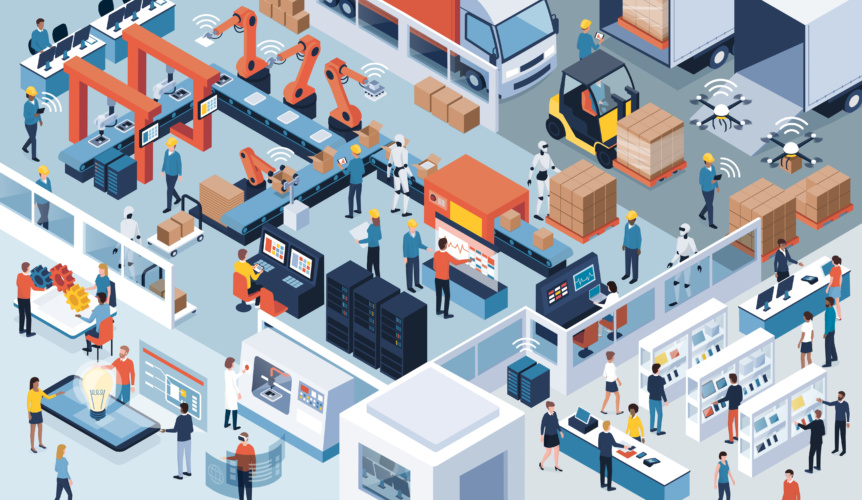Wireless, connected and interoperable factories, data transparency across supply chains and next generation products: concepts that ten years ago sat in the realm of ‘blue sky thinking’ now seem almost within grasp for the manufacturing industry.
And yet, according to a recent Digital Catapult poll, only two fifths of manufacturing business leaders say their company has already invested in technological innovation. In 2021 - with the digital sector estimated as being worth more than £400 million a day to the UK economy - calling this a wasted opportunity could be considered an understatement.
Bullet-proofing our future industries
The projections speak for themselves: a UK productivity boost of 30%, 175,000 new jobs created over the next 10 years and as much as much as £455 billion for UK manufacturing. And those are the ambitions of just one initiative - the UK’s flagship Made Smarter movement, which helps manufacturing businesses and their wider supply chains supercharge value and impact through digital technologies.

From increasing data transparency between organisations, to deploying internet of things (IoT) devices to improve onsite health and safety, technologies give us the opportunity to boost productivity, build a more resilient value chain, cut emissions and waste, and ultimately, create better products and services for consumers.
Take just one example of sustainability: by encouraging a more effective flow of data between organisations, we can increase visibility across the entire supply chain and pinpoint opportunities to cut waste, reduce carbon and uphold higher environmental standards.
Barriers to Industry 4.0
The next few years could see some really crucial developments come to the fore. Despite its unparalleled challenges, arguably the coronavirus pandemic has presented manufacturers with a chance to reassess and reset - with 77% saying the pandemic has made their business more open to change and innovation in a recent Made Smarter Technology Accelerator poll.
However, the research also revealed the barriers to accessing these benefits, including a lack of budget - hardly surprising in the context of the pandemic. This was closely followed by cyber security concerns (32%) and a lack of digital skills within the company (30%).
So, the appetite is there, but refining applications to use tech meaningfully – ensuring its successful integration into a wider digital ecosystem, involving multiple technologies and organisations - remains a challenge. This is key to ensuring that we can truly experience what is being dubbed as the ‘fourth industrial revolution.’
A springboard to success
Accelerator programmes can act as a springboard for tech-startups and scaleups who need to take their pioneering ideas from paper to product, but who may not have the resources – helping them develop prototypes or minimum viable products to be tested in live environments.
By empowering them to join forces with manufacturers to share valuable insights, knowledge and best practice, and even offering opportunities for thousands of pounds worth of grants, accelerators can help alleviate some of the wider industry’s concerns around budget and lack of internal skills and capabilities.
Optimising products and services
Programmes like the Made Smarter Technology Accelerator have seen businesses work on projects controlling bacteria levels on food products for consumers, to using artificial intelligence for visual inspection of items on the production line.
One of our partners, Sainsbury’s, is currently looking to reduce food spoilage and increase shelf life of products. Existing data capture technologies fail to deal with the complexity of supply chains, and as such, there is no way of clearly understanding the impacts of specific events (for example, a temperature spike) along the supply chain on an end product.
Sainsbury’s will be working with technology companies to develop real-time data collection and automated feedback tools to manage relationships along the supply chain. The aim: to optimise time, temperature and hygiene controls, and achieve effective business demand planning – all of which could deliver huge benefits to the wider food & drinks industry.
Looking ahead
Reducing food spoilage is just one of countless, transformative applications technology has for manufacturing processes across the wider economy.
What’s certain, in a post-pandemic world, faster technological adoption will be key to maintaining a thriving, productive economy and maintaining the UK’s place on the global stage.
Whatever an individual company’s barrier to tech development or digital adoption, the immeasurable value of cross-organisational, cross-sectoral collaboration should not be underestimated, and accelerators can be a great place to start.
Made Smarter Technology Accelerator Project Partners
Made Smarter, Digital Catapult, UK Research and Innovation (UKRI), Industrial Strategy Challenge Fund, BAE Systems, Babcock, GAF, Northumbrian Water, O'Neills, Safran, Sainsbury's, Software AG










Water Sector Talent Exodus Could Cripple The Sector
Maybe if things are essential for the running of a country and we want to pay a fair price we should be running these utilities on a not for profit...